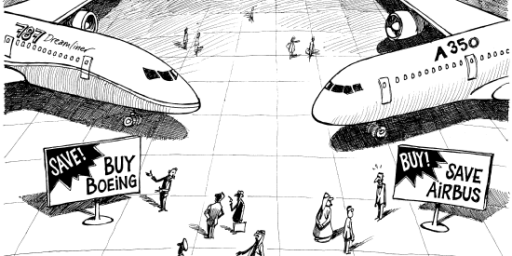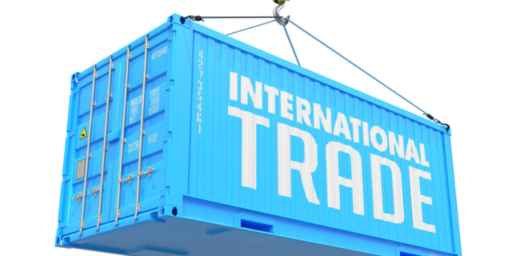U.S., EU Declare Biggest Trade War
The World Trade Organization faces its biggest test ever, as the United States and European Union square off over the commercial jetliner market.
U.S., EU declare biggest trade war (Chicago Tribune)
The U.S. and the European Union launched the largest trade war ever Tuesday, pitting the interests of two giant aircraftmakers as they vie for control of the lucrative market for commercial jetliners. The U.S. launched its case Tuesday at the World Trade Organization in the face of mounting evidence that European governments plan to provide as much as $1.7 billion in low-interest loans to help Airbus launch its newest plane, the A350. The EU immediately retaliated, claiming Boeing’s 787 Dreamliner has received more than $7 billion in tax incentives and infrastructure support.
However, the EU left out of its case an issue that Airbus has complained loudly about: $1.6 billion in subsidies expected to come from Japan to support Japanese suppliers that will build the wing section of the 787. Trade experts speculated the EU backed away because it feared opening the issue, since many European suppliers receive government support.
The huge dispute between two of the world’s largest trading partners threatens to disrupt relations between the U.S. and EU at a time when they need to work together to advance their mutual interests. They are seeking to complete the latest round of World Trade Organization negotiations and deal with the sharp rise in Chinese textile imports, the theft of intellectual property and other concerns.
It makes little sense to expand WTO until we come to terms with the existing requirements. While the United States is naturally less inclined to government subsidy and protectionism than its more socialistic counterparts in Europe, the fact of the matter is that all governments protect key industries, especially those with military-national security implications. These issues need to be resolved before going further.






Is this really a “trade war?” Tariffs and other trade restrictions aren’t being placed on each other’s goods. The two parties are just going to loudly argue at the WTO. Wasn’t that one of the points for the creation of that body?
One of the EU’s complaints is that Boeing gets de facto government subsidies through its government contracts. If the 767 tanker deal had gone through, I’d say they have a much stronger case.
The de facto subsidy business from military contracts is pure crap though, as Airbus owners, the ones who do much of the airframe construction, are themselves large defense and aerospace contractors. There technical expertise has been paid for in part by military contracts. Also Airbus has military business itself, for VIP transports, the A330MR tanker and transport, and of course the A400 military transport. I’ve seen Airbus supporters proudly proclaim that the latter will be paid for completely by the government and will give Airbus the technical know how regarding building composite fuselages.
As far as US military contracts being a subsidy, we can look at the number of aerospace companies receive defense contracts and count the number that were in the end successful in the commercial space, and count only one. And then we can look at the relative amounts of defense money these companies received and realize the successful one, Boeing, received the least. Then maybe we will realize that defense business can be a distraction because it diverts engineering resources to other products and fields that have narrow application outside of the defense market.
Besides the theft of of intellectual property it also has to be discussed what should be intellectual property and what shouldn’t. Patents on software are not necessarily a good thing, for they could arguably (and as far as their propenents are concerned intentionally) make open source software illegal. American patent law also makes it possible to patent far too generic and sometimes downright trivial stuff, which in turn means that the patent holder can collect money from a huge swathe of companies. The result is that, just for example, force feedback controllers (real force feedback, not just vibrations) for computer games have disappeared since somebody holds a patent on the whole thing. Another examples are patents on one-click online purchases.
Patents expire, so if the person holding the patent actually wants to make money from it they should either sell something using the patented technology, or they should license it in a manner that will maximize their profits. If products using the technology disappear from the market, the patent holders aren’t going to be making money.
As for whether patents could make open source software illegal, I find that unlikely. I do think it will limit the competitiveness and reach of open source software, which is perfectly fine with me. I like open source software, but I don’t think it ought to have an inherent right to all coding inventions.
Copyright is not sufficient to protect investments in ideas involved in algorithms implemented in software. If you don’t have software patents, open source programmers will simply take those ideas or reverse engineer those algorithms and implement them in their packages, reducing the incentive to invest in developing sophisticated software algorithms. Alternatively, countries with low cost programmers will take advantage of algorithmic inventions developed elsewhere and undercut on price.
Now I would argue that the 20 year life of a patent might be excessive for software, where the cost of development is the principal cost, and with the only costs afterwards being for service, support, marketing and distribution costs since manufacturing costs approach zero.